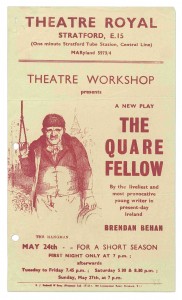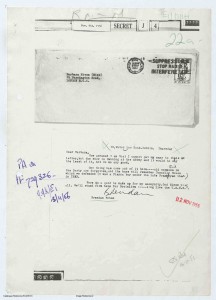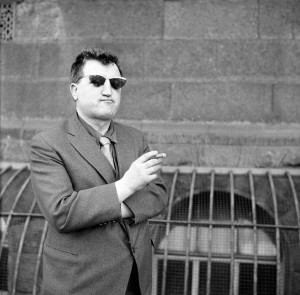‘I have no intention of dying for Air France’: ‘Brandon’ Behan’s MI5 File
Published in 20th-century / Contemporary History, Features, Issue 6 (November/December 2014), Volume 22A garrulous, lightning-witted, talent-squandering, hard-drinking ‘character’, Brendan Behan embodied a certain Anglo-American stereotype of an ‘Irish writer’ to the hilt. Dead at the age of 41, his drinking was, as his one-time friend Anthony Cronin would say, no laughing matter, and yet it is sometimes hard not to laugh. From 1956 onwards, when Joan Littlewood’s east London-based Theatre Workshop production of his play The Quare Fellow—a powerful indictment of capital punishment—attracted favourable critical attention, and Behan himself made television history by appearing drunk in an interview with Malcolm Muggeridge, the British press could not get enough of his antics. ‘It’s The Quare Fellow Again!’ trumpeted a headline in The Daily Herald (1 April 1958). Behan had been held overnight by the Paris police after causing a ruckus on an Air France flight. Asked by the Herald reporter about the episode, ‘Mr Behan shook a stubby finger and said: “Listen. I may not be an expert radio engineer but you can take it from me I’m an expert passenger and I have no intention of dying for Air France. That plane was flying WITHOUT RADIO”.’ A mere 146-word piece in the News Chronicle (4 September 1958) began with ‘Brendan Behan raised his pint tankard’ and ended with him reaching ‘for his newly-filled’ one. Six weeks later, the Herald conveyed a startling account of ‘The Night Behan Was Not Himself’, which concludes with the information that at 10.32pm on that evening ‘he was still sober’. There was, of course, a strong streak of showmanship in this public behaviour by a man who once observed that ‘all publicity is good except an obituary notice’. Many years later his brother Brian responded to his own detractors that he regarded ‘being stage-Irish as a trade like any other’.

Poster for Joan Littlewood’s Theatre Workshop production of The Quare Fellow in May 1956. In the wake of its critical acclaim—and a drunken television interview with Malcolm Muggeridge—the British press could not get enough of his antics. (UK National Archives, Kew)
‘Brandon’s’ (as one phone-tapper identified him) MI5 file (National Archives, Kew, KV2/3181), much of which is a scrapbook of press cuttings, confirms much of what is already known. The electronic eavesdropper who related Behan’s inconsequential telephone call to the headquarters of the British Communist Party (25 August 1957) ‘assumed from the above conversation that Brandon was either a little mad or drunk’. When arrested in 1952 for contravening the expulsion order imposed after his release from Borstal in 1941, Behan told the police ‘I will explain everything but not now as I am suffering from a hangover’. He was deported. It is clear from the file, however, that the security services remained unsure about the subject’s true political views and associates. A 1956 report strikes a rather relaxed note: ‘as he no longer professes any interest in IRA activities or politics generally, he has been allowed to return to this country for the English premiere of his play’. Yet in 1958 a ‘source [had] learned from a contact that the playwright BEHAN has lost none of his sympathy with the IRA and is thought to be a contributor to its funds’. Perhaps, but it was not so much Behan’s Irish republican affiliations that drew the occasional attention of MI5 as the question of whether or not he was ‘a member of the British Communist Party or the Irish Workers’ League’. And whilst there is plenty of evidence for Behan’s militantly left-wing opinions, there is little to suggest that—unlike, at various points, his mother Kathleen, his brothers Brian and Dominic and his half-brother Seán Furlong—he was ever a card-carrying member of the Party, although the file does demonstrate that he was somewhat more than a fellow-traveller.
In 1942 Behan wrote a letter to Furlong from Mountjoy prison—where he was serving a fourteen-year sentence for the attempted murder of a policeman—in which he expressed his growing unease with traditional armed-force republicanism, and contemplated signing himself out by repudiating it:
‘It’s the futility of it all that’s getting me down. Personally I think the Irish people are just browned off with all this bloody game of private armies (that won’t even perform the primordial functions of armies). Seán, I am firmly convinced that Republicanism (God almight[y] it’s not even Republicanism with the half of them) of this particular brand is defunct. So far as I can see the time has come when if anything is achieved it will be by political action. There is some sense in physical force if the people so loud in its praise and so anxious for its application would try a little of it. But they won’t. You know me well enough to recognize that it is not merely that I have grown tired of fighting the fight of our people. You will believe me when I say it is not that I have come to believe that my sojourn in here is doing neither the Irish people nor myself the slightest damn bit of good.’

‘Long live the USSR’—Behan’s private letter to Miss Barbara Niven of the Daily Worker in the wake of the 1956 Soviet invasion of Hungary. (UK National Archives, Kew)
Behan’s disillusionment sprang from ideological conviction, and towards the close of his letter he remarks: ‘I wish they’d start the 2nd Front. What’s the opinion over there [England]? If you get the Daily Worker send it over and also The Week.’ Campaigning for a second front in the west in order to reduce pressure on the Red Army on the eastern front was the top priority of communists everywhere at the time, though not exactly high on the agenda of neutral, Catholic, Ireland. In another letter, the following year, Behan comments: ‘I think the Nazis are finished and if I’m to be shot for the admission I can’t say I’m sorry’.
Thus on the crucial issue for communists during the war, the second front, Brendan Behan knew where he stood, though even more revealing of his hard-line politics was his reaction in 1956 to the Soviet invasion of Hungary. The spectacle of Red Army tanks on the streets of Budapest had a shattering impact on the British Communist Party, which, the historian Eric Hobsbawm recalled, ‘lived on the edge of the political equivalent of a collective break-down’. At that moment of group trauma, when the Party was haemorrhaging thousands of members, Behan chose to write a letter to the Daily Worker urging loyal comrades to ‘carry the flag’. He concluded a private letter to one of the paper’s staff ‘long live the USSR’, and described his brother Brian, among those who left the Party in the wake of the Hungarian crisis, as a traitor. These provocative positions are all the more remarkable for their being articulated by an Irishman during the deepest freeze of the Cold War, and he knew it. He signed the letter to the Daily Worker ‘Eireannach’, and in the accompanying private letter admitted to being ashamed ‘that I cannot put my name to this
. . . but the show is running at the Abbey and it would, to say the least of it, not do me any good’. Not quite all publicity, he realised, is always welcome.
Jim Smyth is Professor of History at the University of Notre Dame.

















